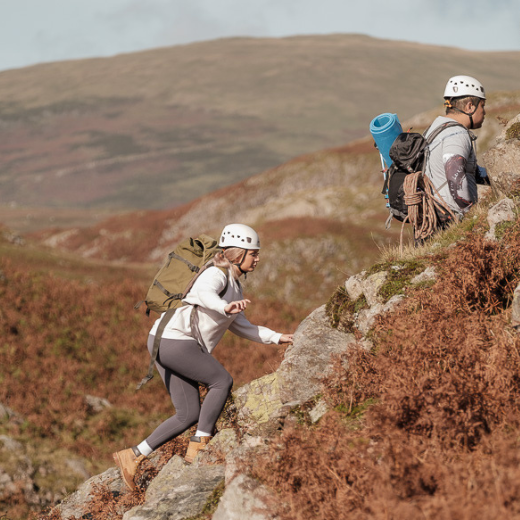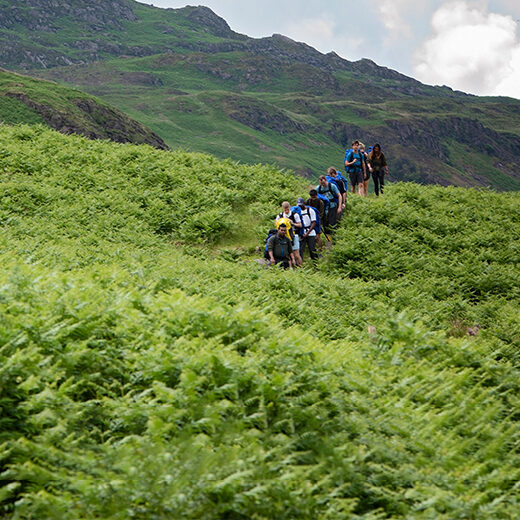Power skills
What are power skills?
Power skills are a new term for soft skills
As an organisation with a heritage linked to seafaring, we weren’t surprised when a quick Google of ‘where do soft skills come from’ showed the term was first used by the US Military in the late 1960s. Their soldiers all had access to the same practical skills and tools, but the differentiator for the most victorious squadrons was HOW they were led.
The term soft skills could have been coined by our co-founders, Kurt Hahn and Lawrence Holt. They started Outward Bound in 1941 to save the lives of young seamen who were dying at sea during World War II as they didn’t have the perseverance, determination and self-confidence built over the years by the older sailors.
Soft skills aren’t soft
One thing we can be sure of… Hahn and Holt would have argued soft skills aren’t soft. They’re essential. For life. For helping young people to realise they are capable of more than they ever thought possible. And at Outward Bound we are celebrating the rebrand.
From soft skills to power skills
Power skills are top traits. Fundamentally they’re the skills that give you real power. Other workplace skills (hard skills, technical skills, knowledge) can be bought in or become obsolete as times change.
Behavioural skills (soft skills, people skills) can’t yet be replicated by a machine. They’re developed in individuals over time. Many from childhood. And all can be built and grown via experience, training and investment in personal development. These powers are augmented by lived experience, practice and feedback.
There isn’t a definitive list, but rather a general consensus that these are core power skills:
- Adaptability
- Collaboration
- Communication
- Creativity
- Critical thinking
- Empathy
- Leadership
- Problem solving
- Teamwork
- Time management
Why the name change?
It isn’t a coincidence that the name change has emerged post-pandemic. Power skills are being seen as increasingly important in the dynamic, often hybrid workplace many organisations have embraced. We’re all facing new challenges with remote working. And the emotional intelligence required to manage others, work alongside someone you rarely see and communicate effectively needs developing in many people. To thrive in a post-pandemic workplace you need to do this well. You need that power.
What do early careers talent need?
Many apprentices and graduates are entering very different work environments to pre-pandemic. Hybrid working doesn’t offer the same style of networking opportunities and learning by osmosis that we have taken for granted for years. Opportunities to watch someone complete a task, listen to your manager explain a process in your earshot, join in with an ad-hoc discussion about a problem or chat about your day over lunch – are far fewer. But your early careers still need to learn and develop, so how can you help them?
How to build power skills
The most effective learning in this post pandemic world is intentional. Taking your early careers talent away from their working environment and focusing on the skills that matter most to your organisation, aligned to your values and their future careers is an investment that will repay you for years.
Learning through adventure at Outward Bound takes young people out of their comfort zone, gives them a safe space to fail fast, review their experience and apply new approaches. The skills learnt in this environment are directly transferable to work and life. They leave realising they can not only take on the challenge of the workplace and of being the newest recruit – but that they have everything in them to go forward with confidence in their career and life. It gives them a feeling of power.
Make learning intentional
Once the power skills have been introduced, you can support apprentices and graduates to keep building on their Outward Bound experiences back in the workplace with mentoring, one-to-ones, networking opportunities, performance reviews and wellbeing support.
Developing and nurturing power skills in your early careers talent is key, for them and for the future of your business. They’re the most important skills you have for the long term success of your organisation. Nourish them and you will reap the rewards.
Further Reading

Top tips to build wellbeing
9 May 22
How to support the wellbeing of your early careers talent.

Developing emerging leaders
1 August 22
Four things to focus on when developing emerging leaders

Building confidence and capability in yo...
19 April 22
Is confidence the 'red thread' we need to focus on for young people?
Free workshop: Leadership
Join us in Manchester on Wednesday 30 November for a free workshop on developing leadership skills in early careers talent.
Client case stories
Working in partnership is key to our approach. Take a look at some of these examples of how we work with clients to develop the power skills needed for their organisation and talent.